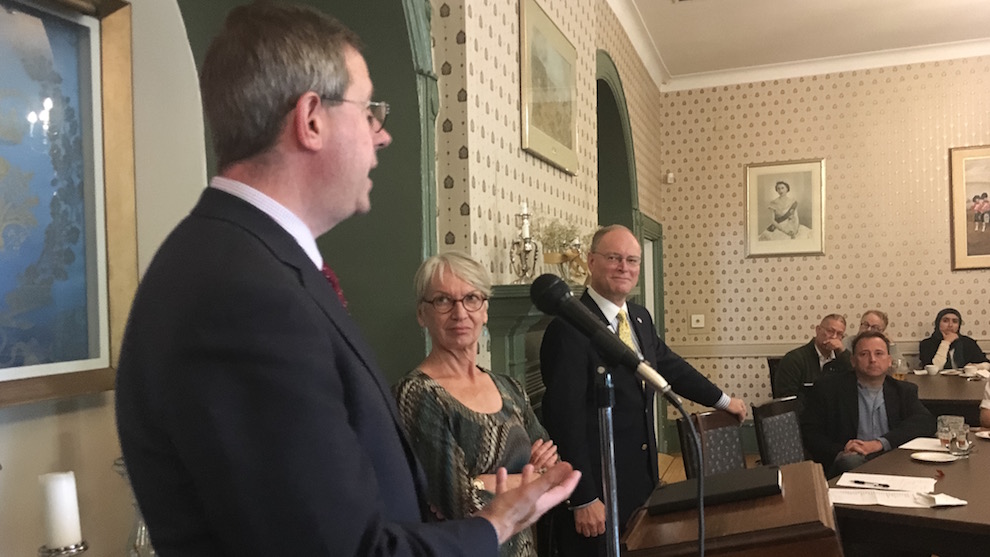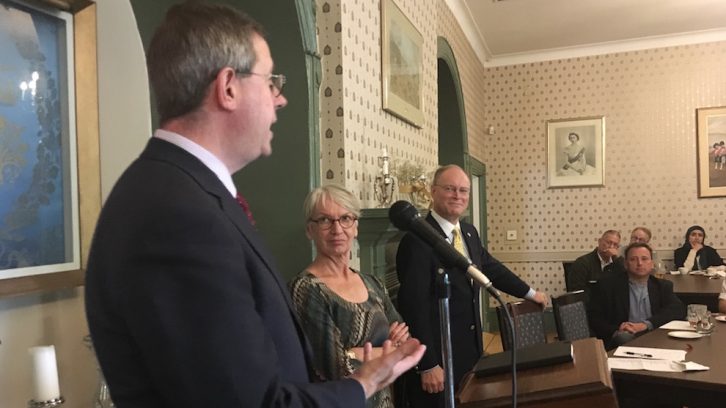U.S. Politics
‘Alienation’ between citizens, government behind fractious U.S. election
Explaining the Clinton vs. Trump race to a Canadian audience

caption
Speaker Christopher Sands, left, with Valerie Bachynsky, president of CIC’s Halifax branch, and David Gough, chair of the Atlantic chapter of AMCHAM.
caption
Christopher Sands, left, with Valerie Bachynsky, president of CIC’s Halifax branch, and David Gough, chair of the Atlantic chapter of AMCHAM.“This U.S. election is coming at a time when Americans don’t trust the government,” says Christopher Sands, an expert on Canadian-U.S relations from John Hopkins University in Washington D.C.
Sands spoke Friday to a group in Halifax – largely academics and business people – about how the polarizing election between Hillary Clinton and Donald Trump came to be.The event was hosted by the local chapters of American Chamber of Congress in Canada, known as AMCHAM, and the Canadian International Council.
“There’s a real concern about the alienation between the public and their government,” says Sands. “People don’t think this represents them and it may be an unfair fight.”
Even when the election is over, Sands finds that people will be reluctant to believe the outcome is legitimate. He says that if people dislike other parts of government, they won’t believe in the system that elects them.
One example is the widespread belief that the decentralized electronic voting systems are vulnerable to hackers.
“I’m not sure if the Pope could bless the election and people would believe it wasn’t rigged,” he says.
David Gough, chair of the Atlantic chapter of AMCHAM, was pleased the event could bring together academics and business people to better understand what the U.S. election means for Canadians.
“The economy here is driven by the elephant next door,” says Gough. Many Canadians depend on trade with the U.S. for their livelihood and, with a new American government, policies could change.
“It’s not like there’s a definite ‘this is going to happen,’ it’s the uncertainty,” says Gough.
Few people thought Trump’s offbeat antics would lead to success in the election, but Sands believes Trump speaks to a people who have felt forgotten by the government. Trump followers trust him, says Sands, for now.
“There’s a lot of people who think ‘Donald Trump has my back. He’s not one of them. He’s someone who understands the working guy,’” says Sands.“It’s important for him to respect the perspectives of people who have put Trump in the final race for president, even if I think they might be making a bad choice.”
“The U.S., as Churchill once said, always ends up doing the right thing, but only after it’s tried all the wrong things first,” he added.
Although the people’s distrust for the government is driving Trump, it works against Clinton, the former secretary of state, who has spent decades in politics.
“Hillary Clinton has been part of our political lives for a long time and so to some extent, she’s carrying the weight of people’s dislike for the establishment,” says Sands.

